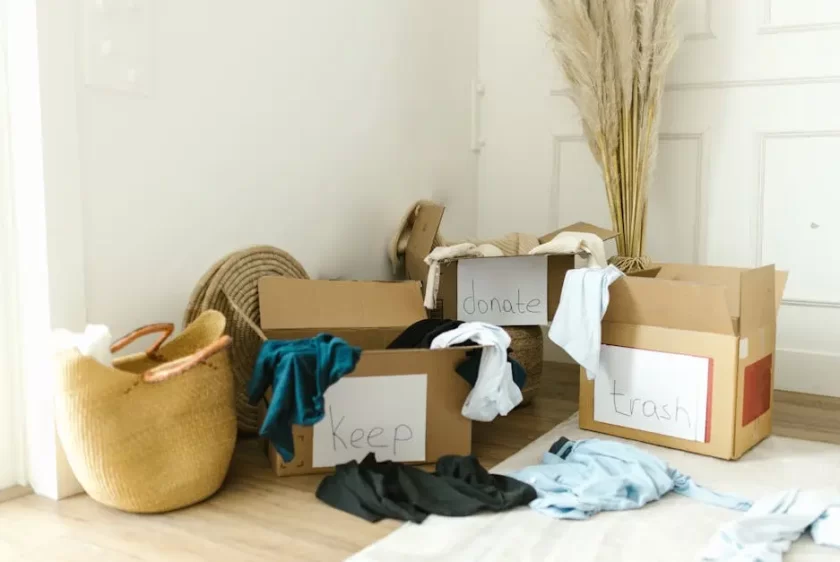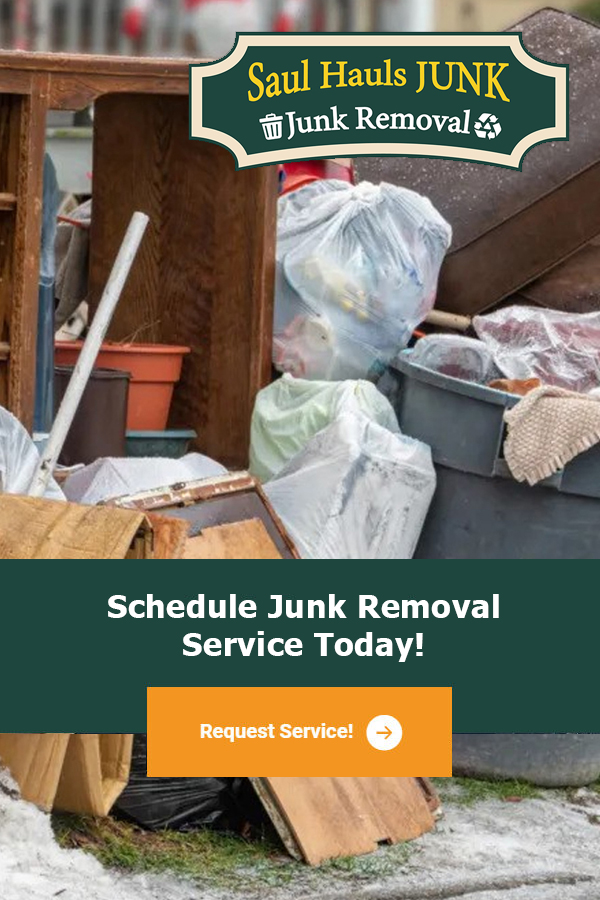
15 Unexpected Items You Can Recycle During an Estate Cleanout
Estate cleanouts can be overwhelming, but they also present a unique opportunity to declutter and recycle items that you may not have considered. Whether you’re helping a loved one downsize or clearing out a family home, there are numerous unexpected items that can be recycled. We’ll explore these hidden gems that not only reduce waste but also benefit the environment.
1. Vintage Electronics and Appliances
Vintage electronics and appliances often gather dust in attics and basements, but they deserve a second chance! Many people overlook the value embedded in these items. Surprisingly, they can be recycled, particularly if they still work. Consider donating functioning appliances to charities or local shelters. Not only does this reduce waste, but it also provides essential resources to those in need.
For items that are beyond repair, check with local recycling centers. Many urban areas have specific programs for e-waste. Old radios, record players, or even retro microwave ovens can often be dismantled safely. By recycling these items, you’re not just getting rid of clutter; you’re contributing to a circular economy, where materials are reused and repurposed, thus conserving natural resources.
2. Old Furniture with a Story
Old furniture can tell a story. Whether it’s a charming rocking chair or a sturdy dining table, these pieces often hold sentimental value. Instead of tossing them into a landfill, think about donating or selling. Nonprofits and thrift stores often accept gently used furniture, bringing joy to new families while keeping items out of waste streams.
Additionally, consider upcycling. A coat of paint or reupholstery can transform an outdated piece into something fresh and functional. Not only does this extend the life of the furniture, but it also creates unique items that add character to your home. By rethinking your old furniture, you can reduce waste and indulge your creativity at the same time!
3. Worn-Out Garden Tools
Worn-out garden tools are oftentimes just tossed aside during an estate cleanout. Instead, these items can be recycled! Rusty rakes and broken shovels may seem worthless, but many recycling centers accept metal items. Recycling scrap metal not only conserves resources but also reduces pollution associated with new metal production.
If the tools still have some life in them, consider donating them to community gardens or local schools that may need them. Gardening is a wonderful way to enhance community spirit, and your old tools could help grow food or flowers for local residents. It’s amazing to think that your outdated equipment could find a new purpose and thrive in someone else’s hands!
4. Unused Medications and Medical Supplies
Many households have a stash of unused medications and medical supplies that often go unnoticed during cleanouts. It’s crucial to dispose of these items properly. Do not just throw them in the trash or flush them down the toilet; both actions can harm the environment. Instead, look for local drug take-back programs which ensure safe disposal.
In addition to medications, unused medical supplies like band-aids, first-aid kits, and unopened gauze can be donated to shelters or charities. These organizations can often use them to provide critical assistance to families in need. This is not only a responsible choice but also a compassionate way to give back, extending the lifespan and utility of these products.
5. Batteries and Electronic Waste
Batteries and electronic waste are some of the most hazardous materials that can go into landfills. During an estate cleanout, be sure to set aside old batteries—whether they’re for remotes, phones, or tools. Many retailers and recycling centers offer specific collection bins where you can safely drop off these items. This simple act reduces the risk of toxic substances leaching into the environment.
Moreover, electronic waste includes anything from broken cell phones to obsolete TVs. These items often contain heavy metals and need careful handling. Research local electronic recycling programs that specialize in safe disposal and refurbishment. Donating functioning electronics—like working laptops or phones—to local schools or organizations can help bridge the digital divide, ensuring others benefit from technology that may no longer fit your needs.
6. Old Books and Magazines
Old books and magazines can accumulate quickly in any home, especially during an estate cleanout. These items can often be recycled or donated, and they carry the potential to inspire others. Start by checking local libraries, schools, or charities for donation opportunities. While it may seem like an overwhelming task, sorting through these items can lead to quite the treasure hunt!
If the condition of your books isn’t conducive to donation, many recycling facilities can process paper items. Repurposing these materials can lead to new products, which ultimately conserves energy and trees. Plus, consider creative ways to upcycle pages from old magazines, like creating collages or art projects. This not only reduces waste but allows you to engage in a fun, artistic activity.
7. Expired Food and Unused Pantry Items
During an estate cleanout, expired food and unused pantry items can often go unnoticed. Before tossing these items, consider your local food bank’s policies. Many will accept sealed, unopened items, even if they’re past their sell-by date. This simple action can make a significant difference to those in your community facing food insecurity.
For the items that aren’t suitable for donation, composting can be a fantastic alternative. If your community has a composting program, add your vegetable scraps, grains, and other compostable food waste to the mix. It’s a great way to contribute to a healthier environment and can significantly reduce the amount of waste going to landfills.
8. Clothing and Textile Waste
Clothing and textiles are among the largest contributors to landfill waste, particularly during estate cleanouts. Many people aren’t aware that they can recycle worn clothing and linens instead of simply discarding them. Charities will gladly accept gently used clothing, while threads that are no longer wearable can often be dropped off at textile recycling bins located in many communities.
Consider organizing a clothing swap with friends or family as well. This fun social event not only breathes new life into your wardrobe but encourages a culture of reuse. Fashion shouldn’t be a fast cycle; it’s about cherishing items and making responsible choices through recycling and donating.
9. Discarded Sports Equipment
Discarded sports equipment can find new homes rather than ending up in landfills. Think about donating gently used items to local schools or youth sports programs. Many organizations welcome bats, balls, and protective gear, especially for children who may not have access to new equipment. This act nurtures community involvement and promotes healthy lifestyles for younger generations.
For those items that are broken beyond repair, recycling can be an option. Check if your local recycling facility accepts plastic or metal sports equipment. With proper handling, the materials can be diverted from landfills and given a second life in new products. It’s an excellent way to keep unused gear out of waste streams while supporting sustainability initiatives.
10. Old Linens and Towels
Old linens and towels often languish in drawers, but they, too, can be recycled or repurposed. Items such as sheets, pillowcases, and towels might be worn, but they can serve a second purpose—consider donating them to animal shelters where they can be used for bedding or clean-up. This not only helps the animals but reduces waste significantly.
For those linens that are too damaged for donation, think creatively! Use them as cleaning rags or cut them into smaller pieces for craft projects. The versatility of textiles is endless, so don’t let them go to waste. Embracing this mindset can help foster a more sustainable approach in your home!
11. Broken Toys and Games
Broken toys and games don’t automatically need to hit the trash bin. Many parents look for quality items to give a second life. Parts of broken toys can often be repaired or repurposed. Those items that are beyond repair, however, can be recycled at specific facilities that accept plastic and metal materials, keeping harmful components from polluting the environment.
Consider holding a toy swap among friends—kids love fresh toys just as much as new ones! This encourages reuse and builds community ties, while also responsibly addressing the clutter that comes from countless toys. Remember, not every game is destined for the dumpster!
12. Unused Home Improvement Supplies
Unused home improvement supplies can create quite the clutter. If you’ve got extra paint, tiles, or lumber lying around, think about donating them to local organizations such as Habitat for Humanity. They often welcome building materials and can put them to good use in community projects. This way, your surplus not only finds a new purpose but also aids in helping others.
If donation isn’t an option, research local hazardous waste disposal events for items like paint or chemicals. These events ensure proper disposal, significantly mitigating environmental impact. Undertaking an estate cleanout becomes all the more enriching when you consider how these items can benefit both you and your community. Let’s give them a second chance together!
13. Outdated Decor Items
Outdated decor items deserve a second look during an estate cleanout too! Just because an item is out of fashion doesn’t mean it should be tossed. Vintage items have found a new audience in the upcycling movement, where creativity reigns supreme. Consider sprucing them up for resale or gifting to friends who appreciate retro styles.
Rather than discarding these items, think about donation. Many thrift stores embrace vintage decor and often find new homes for them quickly. Even broken or damaged items can be repaired or transformed, so let your imagination flow! Remember, what might not fit your style may just be the perfect find for someone else.
14. Packaging Materials and Boxes
Packaging materials and boxes play a significant role in our waste stream. During an estate cleanout, don’t overlook these valuable resources! Many recycling programs accept cardboard boxes, bubble wrap, and packing peanuts. It’s incredibly satisfying to know that keeping these items out of landfills can make a difference in waste reduction.
Additionally, many businesses and stores are happy to take back packaging materials for reuse, especially if they’re clean and in good condition. Consider using these materials for shipping items to loved ones—doing so helps reduce waste significantly while ensuring the safe delivery of goods. In the end, repurposing these items not only emphasizes sustainability but also fosters a sense of community spirit.
15. Old Musical Instruments
Old musical instruments residing in attics or basements can often be overlooked during an estate cleanout, yet they hold immense value—not just financially but also emotionally. Many instruments can be recycled if they are no longer playable. Check with local schools or music programs; they often accept instrument donations, providing not just a new home for the item but also an opportunity for a new musician to thrive.
Alternatively, consider selling these items at local music shops or online marketplaces. Even damaged or broken instruments can find a second life—wood can be repurposed for art projects or furniture, and metal parts may be recyclable. By exploring all your options for old musical instruments, you contribute to sustainability while sharing the love of music with others.


